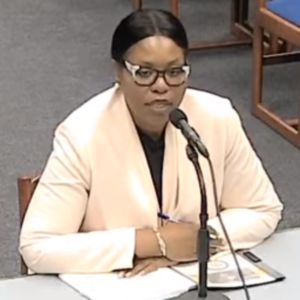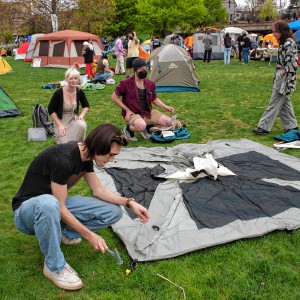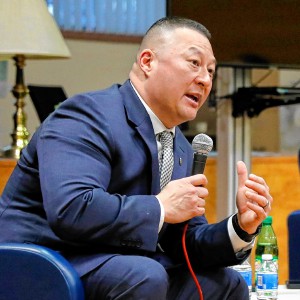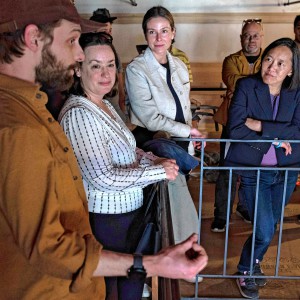School meals for all: Advocates for making student lunches permanently free showcase their success at Northampton school
| Published: 05-16-2023 7:00 PM |
NORTHAMPTON — As the school year winds down in communities throughout Massachusetts, legislators on Beacon Hill will soon determine whether students will continue to get free lunches, as they have throughout the pandemic, when they return to school next fall.
Since the COVID-19 pandemic, schools across Massachusetts have not charged for school lunches, thanks to federal relief programs that provided aid to districts and supported students when schools shut down. When the federal spigot officially shut off at the end of last school year, Massachusetts legislators voted to extend the program for another year, allocating $110 million in last year’s budget to keep free meals going.
At JFK Middle School in Northampton on Tuesday, public school officials, representatives for Project Bread, School Committee members and other advocates for making free school meals permanent sought to showcase the success the initiative has had in feeding a majority of the students at the seventh and eighth grade school.
Since the pandemic, the district has partnered with Project Bread, a statewide organization that works to solve issues of hunger, on a program known as the School Food Fellowship that provides professional training and development for school nutrition staff, helping create new recipes for lunches that meet the standards of the U.S. Department of Agriculture.
Students can also give feedback on recipes, so that staff know what works and what doesn’t when it comes to feeding kids.
“We’re looking for a majority of students to give their approval,” said Sam Icklan, director of community nutrition services at Project Bread. “It’s a fun collaboration process that highlights what the staff here are already doing.”
During a visit to the cafeteria for lunch, seventh graders were given one such meal to come out of the partnership, a lunch of Freshampton Cheesesteak, a type of cheesesteak sandwich served with Freshampton Sauce, a kind of thousand island dressing, with a side of sweet potato fries. Students no longer pay when they leave the serving area — instead, they merely go up to the counter and punch in a student ID number that signifies that they have received their lunch.
Kristin Thibedau, the head cook at JFK Middle School, estimates that before the advent of free school lunches, around 250 kids would get lunch from the cafeteria. Now, that number is closer to 400, or about 68% of students at the school. According to Project Bread, more than 1,000 students across the district take advantage of the free lunch program, a 44% increase since pre-pandemic levels.
Article continues after...
Yesterday's Most Read Articles
 A Waterfront revival: Two years after buying closed tavern, Holyoke couple set to open new event venue
A Waterfront revival: Two years after buying closed tavern, Holyoke couple set to open new event venue
 Services being held Thursday for Greenfield homicide victim
Services being held Thursday for Greenfield homicide victim
 Island superintendent picked to lead Amherst-Pelham region schools
Island superintendent picked to lead Amherst-Pelham region schools
 Area property deed transfers, May 2
Area property deed transfers, May 2
 Granby Bow and Gun Club says stray bullets that hit homes in Belchertown did not come from its range
Granby Bow and Gun Club says stray bullets that hit homes in Belchertown did not come from its range
 3-unit, 10-bed house in backyard called too much for Amherst historic district
3-unit, 10-bed house in backyard called too much for Amherst historic district
“We have to make twice as much food as we used to,” Thibedau said. “We have a lot more children [getting lunch] because everyone’s equal now.”
So what do the students think about their new meals?
“It’s all right,” said Dillon Gianesin, a student at JFK. “Some of them are better than others.” Gianesin said he usually gets lunch from the cafeteria every day, but acknowledged that he probably wouldn’t take lunch if it wasn’t free.
Ngyuen Thach, another JFK student, had a more positive opinion of the lunches.
“They’re very good,” he said. “The only thing is, I think they should put more nutritional facts on them so I know what I’m getting.”
But Thach also said he would likely not get the lunches as much if they were no longer free.
With free school lunches set to expire after this school year, Massachusetts lawmakers have introduced legislation that would make them permanent. Bills in both chambers have a large number of sponsors, including many legislators from this area.
“There is a federal program that has been in place for a number of years that allows districts that have a higher percentage of low-income students to provide universally free school meals,” said Jennifer Lemmerman, vice president of public policy for Project Bread, which helped craft the proposal. “What our bill would do is require that all districts participate in that program so that we can draw down as many federal dollars as possible.”
Any remaining funds required for funding universal school meals would be provided by the state Department of Elementary and Secondary Education. If enacted, Massachusetts would join several other states that have enacted free school meals, including California, Colorado, New Mexico, Minnesota and Maine.
If the bill fails, then paid school lunches would return, Lemmerman said that, as would the phenomenon of students going into in debt for school lunches, while 400,000 students in the state would lose access to free meals. But with a large number of legislators sponsoring the bill, she is confident about its chances of passing.
“We’re really optimistic, but at the end of the day, these schools aren’t going to have certainty,” she said. “I was just talking to the [Northampton] high school nutrition director, and they had to delay their ordering for next year because they don’t know what they’re going to be walking into. So until they have that certainty, nobody can be sure.”
Alexander MacDougall can be reached at amacdougall@gazettenet.com.

 Pro-Palestinian encampment disperses at UMass, but protests continue
Pro-Palestinian encampment disperses at UMass, but protests continue Amherst council confirms Gabriel Ting as police chief
Amherst council confirms Gabriel Ting as police chief Music key to Northampton’s downtown revival: State’s top economic development leader tours city
Music key to Northampton’s downtown revival: State’s top economic development leader tours city 
